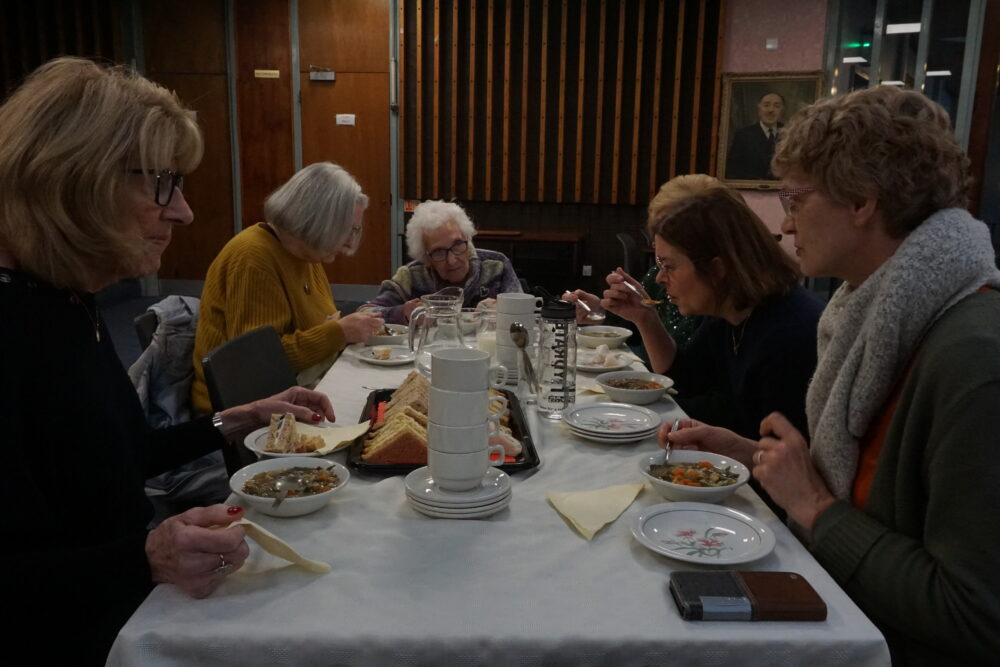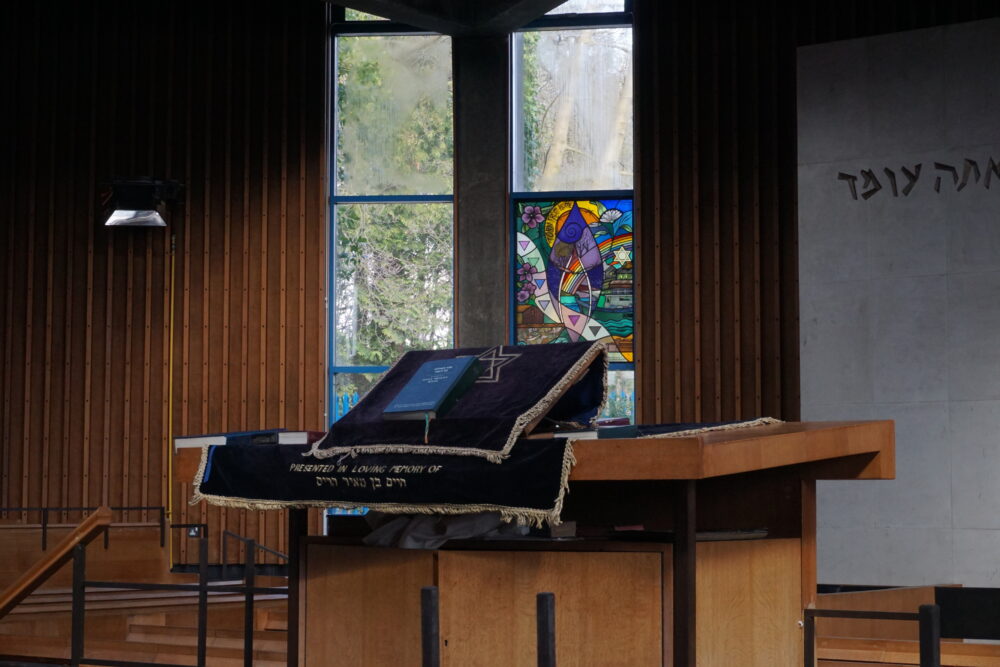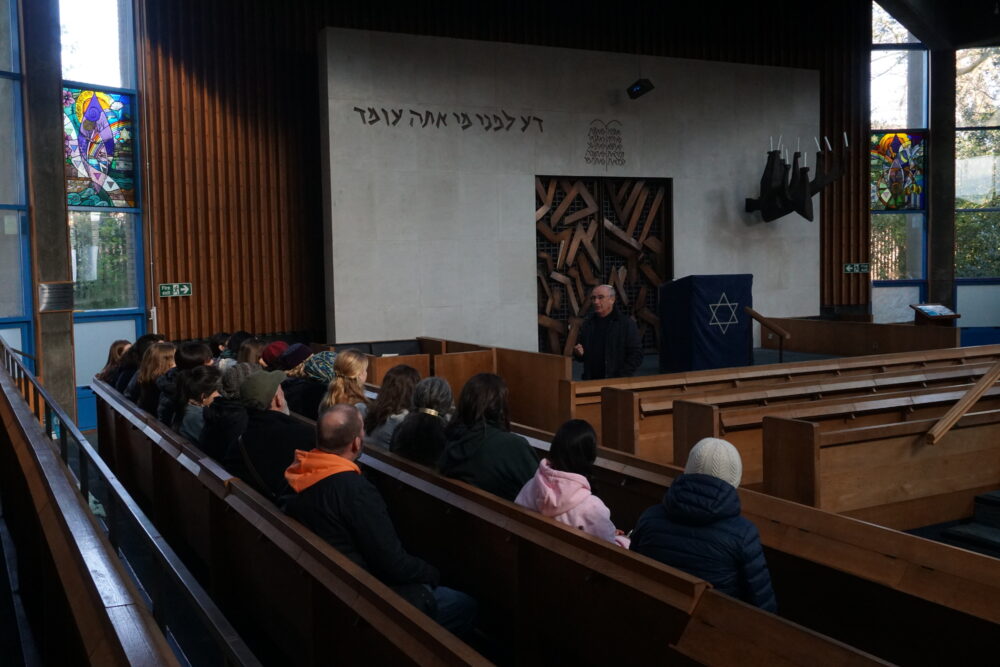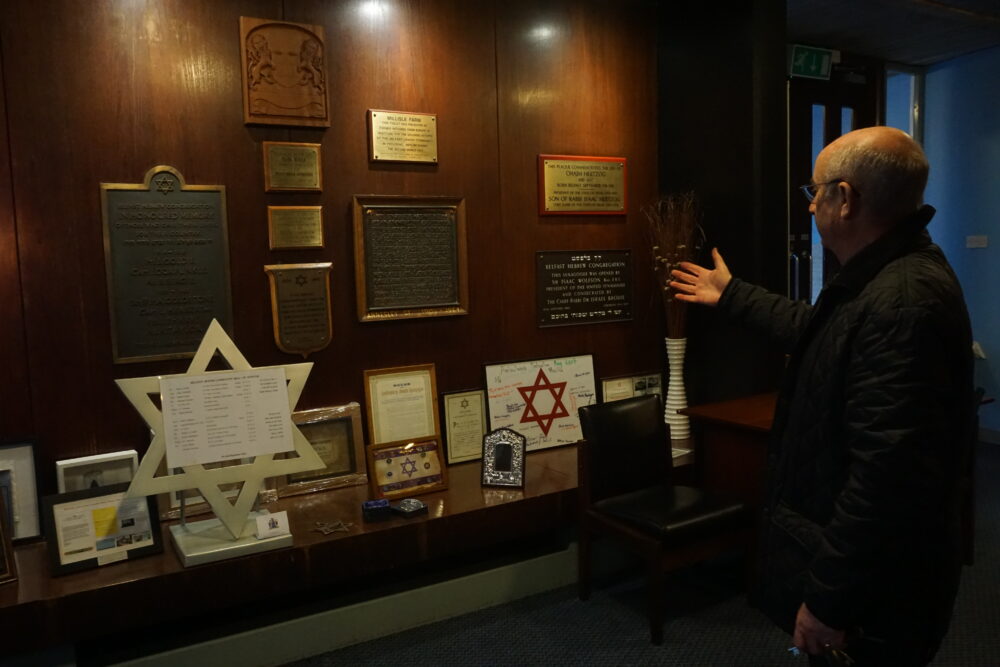
BELFAST, Northern Ireland — On Saturdays, the Jewish day of rest and prayer, there is barely a quorum of 10 at the old synagogue in Northern Ireland’s capital city. But every other Wednesday, the place is hopping. A gaggle of seniors gathers for lectures, conversation, lunch and socializing. Only some of them are Jewish.
“I come here mostly for company. I see my friends, and I enjoy the talks. It gets me out once a fortnight,” said Norma Simon, 94, one of the members of the synagogue. Non-Jewish people, like Eleanor Minahan, who is Catholic, come to the meetings because they enjoy the conversations. “Most of the people that I meet here, I don’t meet in any other circumstances,” said Minahan.
Hilary Shields and Carolyn Hiltitch go to the same Anglican church on Sundays, and every two weeks they join the Wednesday Club. “[The meetings] are informative, entertaining, sometimes boring,” said Shields. “They make us feel very welcome, and it’s nice to be with friends.”

The Belfast Jewish Community & Hebrew Congregation started these meetings in 2009 to encourage more time together and connect with people outside of the Jewish community. “To stop just being inward-looking, to be more outward-looking,” said Jane Danker, the organizer. “And as you can see, we all mix and match.”
About 30 seniors, in their 70s, 80s and 90s, join the biweekly meetings, called “Wednesday Club.” Common activities include hearing speakers talk on a wide range of topics, playing trivia games, listening to music and sharing a meal.
By talking about topics that are common to any faith, the community tries to find common ground with its non-Jewish neighbors. “We’re so few that everybody matters. We try to come to make up the numbers,” said Shoshana Appleton, one of the Jewish members. Only 439 people identified as Jewish in the latest Northern Ireland census, taken in 2021. This represents a steep decline from the 1960s, when there were a few thousand Jews in Northern Ireland. The downward trend is in contrast to the rest of the United Kingdom, where the number of Jews has increased almost 6% in the last 10 years, with 287,360 people in England and Wales, according to the 2021 census.
The synagogue, known as the Belfast Hebrew Congregation, is the only one in Northern Ireland. It sits in a mixed, but mainly Catholic, neighborhood in North Belfast and is an architecturally round synagogue with beams that form a Star of David on the roof.
When it was built in 1964, it was a house of worship for 1,500 Jews. Today, it serves only 54 active members, mostly retired people with no children. They hold services weekly for each Saturday and on the main holidays. Over the years, the synagogue was renovated so that there is less room for worship and more space for meetings and social activities.
“When everybody left, we condensed it, we built this wall and we turned this into a functions room,” said Ivonne Danker, an active member of the Belfast Jewish Community, gesturing around the synagogue. She explained that the big exodus of Jews from Northern Ireland occurred during the Troubles, a period of conflict between the late 1960s and 1998. “That was our future generation — gone.”

In addition to the Wednesday Club program for seniors, the synagogue gets visitors from Northern Ireland and abroad who are interested in learning about Judaism. On a recent spring day, the deputy chairman of the Belfast Jewish community, Michael Black, gave a tour to a group of 21 American students visiting from Middlebury College in Vermont. He showed them the sanctuary, which faces Jerusalem, and the Holy Ark, which contains the Torah scrolls.
The visit of the group, composed of students and professors from the class “Conflict: Transformation in Northern Ireland,” ended at the Yahrzeit Wall, a special room where the names of the deceased are remembered and commemorated by the community. There, Black explained that during the anniversary of a loved one’s passing, a Yahrzeit light is lit in their memory.

The immediate challenge for Belfast’s Jewish community is to find a new rabbi after six years with Rabbi David Kale. The community leaders are aiming to have someone outgoing and “receptive to other groups of Jews” by June 3. They are looking for someone who can lead prayers and teach Bible classes as well as help the Chevrah Kadisha, a citizens’ group that helps prepare the dead for a Jewish burial. Additionally, the community hopes to reach out to the Jewish students at Queen’s University Belfast with the hope that they will use the space for meetings and Shabbat dinners on Fridays.
As the Jewish community of Belfast is getting smaller, the leaders are rethinking the future. The synagogue is a Listed Historic Building of the Northern Ireland Department of Communities, which means it is protected by legislation and, therefore, requires consent for alterations.
Black imagines the synagogue could become a cultural center, a museum and an educational center.
“I think it’s only a matter of time before we disappear as an Orthodox community,” he said. “I would like to leave a legacy.”

Photo at top: The Wednesday Club at the Belfast Jewish Community meets every two weeks. (Photo by Rosario del Valle)
